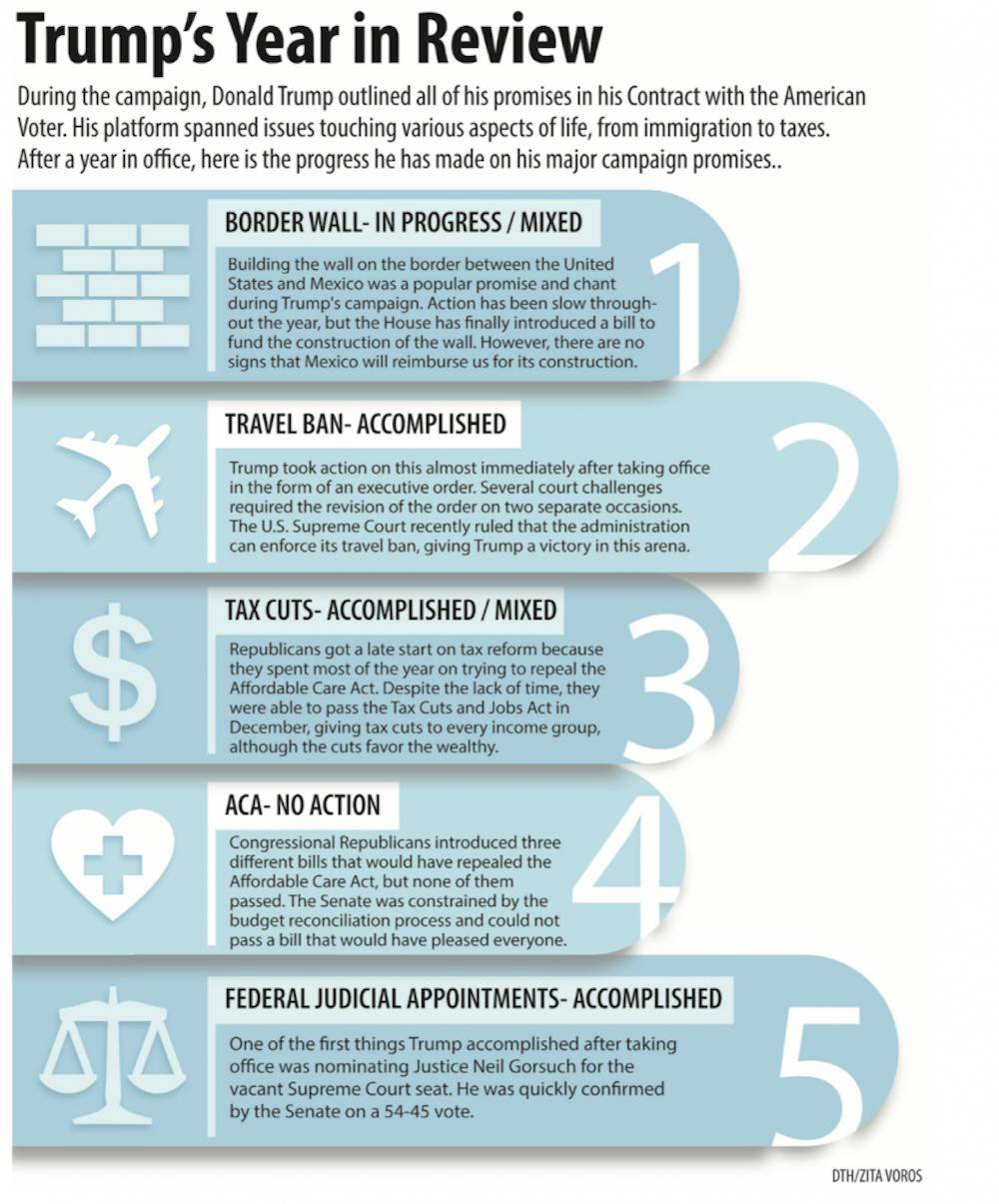Executive Order 13780 was signed three months later. The new order suspended entry into the United States from Iran, Iraq, Libya, Somalia, Sudan, Syria and Yemen for 90 days because the countries presented heightened terrorism concerns.
After challenges from federal courts, Trump created a new travel ban in the form of a presidential proclamation. The third ban sought to restrict immigration by banning entry just like its first two counterparts, but it changed the list of “inadequate” countries to Chad, Iran, Libya, North Korea, Syria, Venezuela and Yemen.
Throughout the year, organizations like the American Civil Liberties Union challenged the ban, calling it a Muslim ban. The Trump administration finally saw a victory when the U.S. Supreme Court ruled in December to allow enforcement of the ban.
The administration also rescinded former President Barack Obama's Deferred Action for Childhood Arrivals program in September, but continues to face legal challenges on this action's constitutionality.
Another aspect of Trump’s platform was his stance on regulations. He said he would require that for every new federal regulation, two be rescinded.
Although this language has not been written into law, the U.S. Department of Education has started deregulating many aspects of schooling. In October, the department rescinded 600 regulations they deemed outdated, including guidance on regulations for students with disabilities.
Betsy DeVos, secretary of the department, also did away with Obama-era rules on how universities should deal with sexual assault under federal Title IX law. The action gave schools more independence in making policies regarding sexual assault.
DeVos has supported reauthorizing the Higher Education Opportunity Act and simplifying the Free Application For Federal Student Aid. The PROSPER Act, proposed by the U.S. House of Representatives, could bring this type of reform to higher education policy.
Based on his campaign promises, Trump's first year has delivered in some areas while stalling in others.
“He pledged to be anti-immigrant, and he certainly is. He said he was going to build a wall with Mexico’s help, but Mexico certainly isn’t going to do that,” Stimson said. “So, it’s a mixed bag.”
Policy ups and downs
Despite Republican majorities in both houses of Congress after the 2016 election, the Trump administration was unable to accomplish some of its major goals.
To get the day's news and headlines in your inbox each morning, sign up for our email newsletters.
Soon after taking office, Trump nominated Justice Neil Gorsuch for a Supreme Court seat, and he was confirmed by the U.S. Senate in April 2017.
“For much of the year, that was the only legislative accomplishment that Trump supporters could hang their hats on,” said Mitch Kokai, a senior political analyst at the John Locke Foundation.
After Justice Gorsuch, Trump nominated people to fill other vacancies within the judicial branch, such as judges in district courts. Rob Schofield, director of NC Policy Watch, said a lot of the nominees are unqualified and have little experience as lawyers.
Kokai said it was easy for Republicans to confirm Justice Gorsuch but that it would be harder for them to pass their other goals due to the budget reconciliation process adopted by the Senate.
The budget reconciliation process, created by the Congressional Budget Act of 1974, allows the Senate to expedite the process of passing legislation. It also puts restrictions on debate and content of a bill. Invoking this process would allow the Senate to pass legislation with only a 50 percent majority instead of the usual two-thirds.
Kokai said this was beneficial to Republicans because they only had a simple majority in the Senate, but it also hurt them in some ways.
“What they ran into with the Affordable Care Act was they couldn't get something passed that would meet all of the various requirements while also satisfying all the different priorities of people interested in reform,” Kokai said.
Republicans, facing a Sept. 30 deadline, introduced three bills in an attempt to repeal the ACA, none of which passed.
They then turned their focus to tax reform, another key part of Trump’s platform. He promised tax cuts for families and corporations.
An early version of the tax bill included provisions that could have increased taxes for universities and students, discouraged donations to universities and taxed tuition waivers for graduate students.
Congress passed the Tax Cuts and Jobs Act in December. According to a report from the nonpartisan Tax Policy Center, the tax bill decreases taxes for every income group compared to the current law. Tax cuts are largest for higher-income groups, with the largest cuts going to 95th to 99th percentile of income earners.
Kokai said the tax bill was not ideal because Republicans got a late start due to the attempts at ACA repeal.
“The Republicans put forth a strategy where they wouldn’t have to work with Democrats at all, and they got mixed results,” he said.
Trump’s approval and looking to the future
On Jan. 23, 2017, Trump had a 45 percent approval rating, according to a Gallup poll. Though it has fluctuated, his approval rating has remained under 50 percent for his entire first year.
Schofield said perceived popularity can impact how Congress and the media behave.
“There is compromise to be had out there, but the problem Trump has faced is that his hard-right followers don’t want compromise on, say, immigration, healthcare and education policy," Schofield said. "Those are all areas where Democrats have staked out pretty moderate positions and would be willing to make an agreement. As long as he remains loyal to his far right base, he’s going to have a problem.”
Kokai said these low approval ratings could impact how Republican voters act in 2018, specifically people who are Republicans but not avid Trump supporters or who are only right-leaning.
He said Trump’s effect on candidates themselves will be something to look out for when watching the 2018 midterms unfold.
“If Donald Trump ends up having some success, I would not be surprised if both parties end up looking beyond the traditional places for candidates,” Kokai said.
Stimson said he is more concerned about Trump’s effects on political institutions as a whole in addition to candidates that will be seen in the future.
“I can see a scenario where Trump is losing two years from now and refuses to accept the election outcome,” he said. “That kind of ends the United States as we know it. That might not happen, but there has been no previous president who worried me like that.”
“After 200 years of democracy, we’re in an experimental phase where we don’t know what the future looks like," Stimson said.
@ampogarcic
state@dailytarheel.com
Anna PogarcicAnna Pogarcic is the editor-in-chief of The Daily Tar Heel. She is a senior at UNC-Chapel Hill studying journalism and history major.






